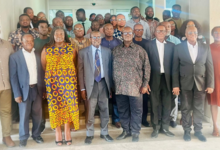Public Health nurses hold confab in Ho

THE 33rd annual conference of the Public Health Nurses Group (PUBHENG) opened in Ho last Thursday with a call for greater commitment of resources for mental health care delivery.
“This is very important because at the community level mental health is still at its infant stages and needs sustenance,” said Dr Timothy Letsa, Volta Regional Director of Health.
More than 200 members of the group nationwide attended the event which was under the theme: Integrating Reproductive, maternal, neonatal, child and adolescent health programmes with HIV/TB and malaria services -The Public Health nurses leading the way.
Dr Letsa insisted that there was also the urgent need to integrate the prevention and control of other non-communicable diseases such as cancers, hypertension and diabetes and others, since those diseases had common risk factors which could be prevented at the personal, household and community level.
He maintained that integration was one of the surest means to strengthen the primary healthcare and enhance service delivery.
However, Dr. Letsa said that it was important that its adoption and use should take into account the prevailing contextual factors and all other elements that would make it feasible.
“In other words, we ought to be mindful of the setting in which we operate and adopt it to suit our local circumstances,” he told the conference.
The Regional Director of Health commended PUBHENG for sustained efforts towards maintaining and improving upon public health and said that the public health nurse had a vital role to play in the integration of health services, “and this included but not limited to coordination and facilitation of the integration process for efficiency and effectiveness in service delivery.
Earlier, Dr Gloria Chandi, Chairman of PUBHENG appealed for funding and logistics for a 10-year project by the group on violence against women and other initiatives such as home visiting models.
She noted that healthcare was usually organised around treatment and emergency services with less focus on preventive services.
“Nevertheless, evidence exists that healthcare requires sustainable solutions with long term interventions that extend beyond the care for the sick to encompass advocacy, education and community interventions.
FROM ALBERTO MARIO NORETTI AND GRACE SENAM KLAY, HO





